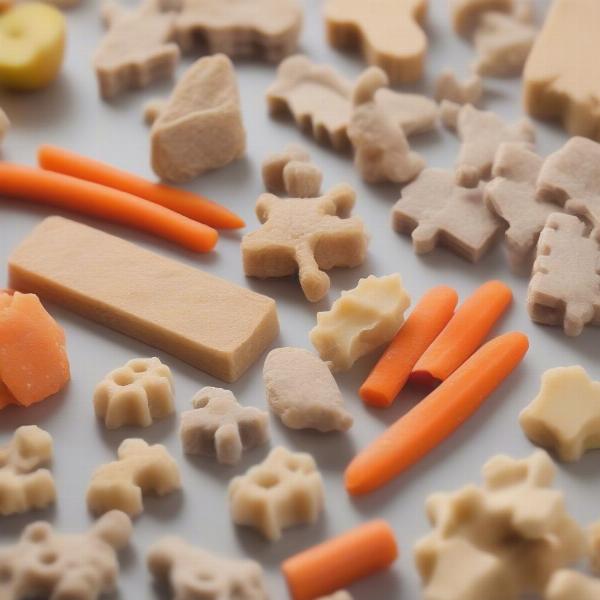The term “corn dog cooker” might conjure up images of delicious deep-fried treats, but what does it have to do with our canine companions? If you stumbled upon this article while searching for a “corn dog cooker,” you’re likely looking for information on cooking and preparing food, perhaps even for your dog. While we don’t recommend feeding your dog corn dogs, this article will address healthy and safe food preparation for your furry friend. We’ll explore dog-friendly cooking methods and discuss why corn dogs are not a suitable part of a canine diet.
While a “corn dog cooker” is designed for human food, understanding its functionality can help us explore safe and appropriate cooking methods for our dogs. Let’s delve into how we can prepare healthy and nutritious meals for our furry friends.
Safe Cooking Methods for Dog Food
When preparing your dog’s food, it’s crucial to prioritize safety and retain nutritional value. Steaming, boiling, baking, and slow cooking are excellent methods for preparing dog-friendly meals. These methods help preserve essential nutrients and ensure that the food is cooked thoroughly, eliminating potential harmful bacteria. Avoid deep-frying, as the excessive oil and high temperatures can be detrimental to your dog’s health.
Why Avoid Deep-Fried Foods Like Corn Dogs?
Corn dogs, a classic deep-fried snack, are unsuitable for dogs for several reasons. The high fat content can lead to pancreatitis, a painful and potentially life-threatening inflammation of the pancreas. The high levels of salt and sugar can also contribute to obesity, diabetes, and other health problems. Furthermore, the cornmeal batter can be difficult for dogs to digest, potentially causing gastrointestinal upset.
Dr. Emily Carter, DVM, a renowned veterinary nutritionist, advises, “While it may be tempting to share your snacks with your furry friend, it’s important to remember that their dietary needs are different from ours. Foods high in fat, salt, and sugar, like corn dogs, can be detrimental to their health.”
Focusing on Nutritional Needs
Instead of resorting to processed human foods like corn dogs, focus on providing your dog with a balanced diet that meets their specific nutritional needs. This includes high-quality protein sources, healthy carbohydrates, and essential vitamins and minerals. Consult with your veterinarian or a veterinary nutritionist to determine the best diet for your dog based on their age, breed, size, and activity level.
Homemade vs. Commercial Dog Food
Preparing homemade dog food allows you to control the ingredients and ensure freshness. However, it requires careful planning and balancing of nutrients to avoid deficiencies. Commercial dog food, especially those formulated by veterinary nutritionists, offers a convenient and balanced option. max dog food Choose a high-quality brand that meets the Association of American Feed Control Officials (AAFCO) standards.
Professor John Davies, PhD in Animal Nutrition, states, “Whether you choose homemade or commercial dog food, the key is to provide a complete and balanced diet that supports your dog’s overall health and well-being.”
Healthy Treats for your Dog
 Healthy Dog Treats
Healthy Dog Treats
While corn dogs are off-limits, there are plenty of healthy and delicious treats you can give your dog. Small pieces of cooked chicken, carrots, apples, and blueberries can make excellent treats. You can also find commercially available dog treats made with natural ingredients. Always check the ingredient list and avoid treats with high sugar or artificial ingredients.
Conclusion
While the search term “corn dog cooker” might have brought you here, we hope this article has provided valuable information on safe and healthy food preparation for your dog. Remember, a balanced diet is crucial for your dog’s health and happiness. Avoid feeding your dog processed human foods like corn dogs, and instead, focus on providing them with nutritious meals and treats that meet their specific needs. Remember to consult with your veterinarian for personalized dietary recommendations.
FAQs
- Can I give my dog a small piece of a corn dog? No, it’s best to avoid giving your dog any corn dogs due to the high fat, salt, and sugar content.
- What are some healthy alternatives to corn dogs for my dog? Healthy alternatives include small pieces of cooked chicken, carrots, apples, and blueberries, or commercially available dog treats made with natural ingredients.
- How can I determine the best diet for my dog? Consult with your veterinarian or a veterinary nutritionist to create a personalized diet plan.
- Is homemade dog food better than commercial dog food? Both can be healthy options, but homemade diets require careful planning to ensure nutritional balance, while commercial diets offer convenience.
- What should I look for in commercial dog food? Choose a high-quality brand that meets AAFCO standards and is formulated for your dog’s age, breed, and size.
- What are some safe cooking methods for dog food? Steaming, boiling, baking, and slow cooking are all safe and healthy cooking methods.
- Why is deep-fried food bad for dogs? Deep-fried food is high in fat and can lead to health problems like pancreatitis and obesity.
Related Articles:
If there are relevant articles on ilmdog.com, list them here with appropriate anchor text.
About ILM Dog
ILM Dog is your trusted source for expert advice on dog care and wellbeing. We offer comprehensive information on various aspects of dog ownership, from breed selection and health care to training, nutrition, grooming, and product recommendations. We are dedicated to helping you provide the best possible care for your canine companion. For personalized guidance or inquiries, contact our team of experts at [email protected] or call us at +44 20-3965-8624.